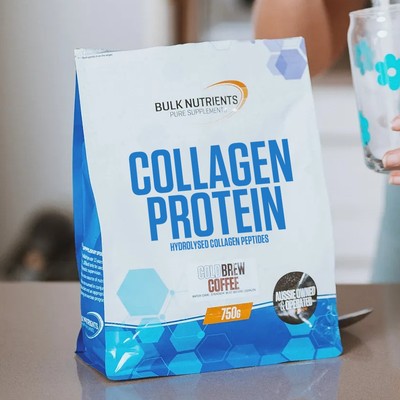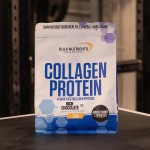What Are Collagen Peptides and How Do They Help?

Can we minimise the effects of ageing?
Ageing is a process that we inevitably go through, and that scientists unfortunately still haven’t been able to reverse. Hair loss, thinning and prevalence of greys, joint aches and pains and the appearance of fine lines and wrinkles are all associated with getting older.
While lifestyle and hereditary factors determine a large proportion of the ageing process and appearance, collagen is involved in all of these processes to some extent. Therefore, it seems logical that supplementing with collagen might minimise these effects, so let’s look at what the research suggests.
What is collagen?
Collagen is the most abundant protein in the human body. Over one-third of the protein in the body is collagen, and its particularly concentrated in bones, muscles, skin and tendons. While several lifestyle factors may negatively impact collagen production (e.g. smoking and UV exposure), the body’s production of collagen naturally declines with age.
Collagen is the major component of the extracellular matrix and is the protein that ultimately determines skin physiology. The extracellular matrix retains water and supports smooth, firm, and strong skin. Collagen is responsible for maintaining the skin structure and it does so very well. The collagen molecules orient themselves into a triple helix, forming collagen fibrils of enormous strength and tensile force. Put in perspective, the properties of collagen are responsible for a wide spectrum of applications in the body from the soft, elastic skin, to the strong, rigid structure of bones.

Interestingly, collagen in its native form is a relatively large molecule – too large to be absorbed efficiently when applied to the skin, and poorly available when ingested. Through a process called enzymatic hydrolysis, collagen can be broken down into much smaller molecules – hydrolysed collagen peptides. Hydrolysed collagen consists of small peptides (0.3-8kDa), produced from native collagen which is found in bones, skin and connective tissue of animals (i.e. cattle, pigs and fish).
Due to its low molecular weight, hydrolysed collagen is easily digestible, absorbed and distributed in the human body. The high absorption of collagen peptides is the major reason why collagen consumed from natural sources as a part of a typical diet does not lead to the same results as supplementation with collagen protein.
After collagen protein is ingested, hydrolysed collagen peptides are further metabolised to bioactive di- and tri-peptides and free amino acids in the gastrointestinal tract, which are then released into the bloodstream. Through the network of blood vessels, these collagen peptides and free amino acids are then distributed in the human body, in particular, they accumulate in the skin, where it has been proven they can remain up to 14 days.
From this point, hydrolysed collagen has a dual-action mechanism:
- free amino acids provide building blocks for the formation of collagen and elastin fibres;
- stimulate the production of new collagen, elastin and hyaluronic acid.
So what does this all really mean? Let's talk through the potential benefits of collagen protein supplementation.

What can collagen protein do for my skin?
Likely, you were first alerted to collagen and its relationship to healthy skin through skincare advertisements for anti-wrinkle creams. Although beauty products may have overreached at times, there is certainly evidence to back the effectiveness of collagen peptide supplementation – be it orally or topically applied to the skin.
A significant level of research has investigated the potential benefits of collagen protein supplementation on skin parameters. Most notably, these include markers of skin ageing, elasticity and hydration – for all of which hydrolysed collagen has proven itself a worthy adversary. The physiological process of skin ageing is directly associated with a decline in collagen formation with increasing age. As collagen production decreases, the skins collagen scaffold loses strength and stability, ultimately leading to the appearance of wrinkles. The good news is, the synthesis of collagen fibres primarily occurs in the deeper layers of the skin. Therefore, providing the right nutrients in the bloodstream via oral ingestion can improve markers of skin ageing.

If it sounds too good to be true, it must be, right? Well here’s something to keep in mind:
A systematic review and meta-analysis are some of the highest forms of data interpretation, condensing down sometimes thousands of scientific research papers systematically based on a strict set of criteria. Using only the studies that meet all of the criteria, the results of each study are standardised so that they can be compared on a like-for-like basis, and in this case of oral supplements, the collective effect of the supplementation for the desired outcome is assessed for significance.
In a recent systematic review and meta-analysis, the results showed a significant improvement in all of the aforementioned skin parameters with supplementation of between 2.5 – 10 g/day of hydrolysed collagen peptides. The results also indicate that consistency is key with collagen protein supplementation, with significant increases in all parameters typically present after 8 weeks of supplementation. On average, skin elasticity increased significantly (approximately 7%) across the included studies when hydrolysed collagen peptides were consumed.
So if it’s that “youthful radiant glow” that you're searching for, oral collagen protein supplements should be a staple in your beauty routine. Not only that, but maximizing and maintaining collagen production during and after times of rapid growth, such as bulking or pregnancy, may help minimise the formation and permanency of stretch marks.
But that’s not all it can do...
The benefits of collagen protein for your hair and nails
Collagen makes up around 70% of the dermis, which is the middle layer of your skin that contains the root of each hair.
A recent study has shown that collagen is strongly deposited in hair follicles, and the lack of collagen delays hair cycling and growth, suggesting that supplementation of collagen is likely to influence the condition of hair. A significant improvement in the dryness and dullness of hair was also noted in a recent study where collagen supplementation was undertaken for up to 14 months.
The same study showed significant repair of damaged, brittle nails, which was also confirmed in a six-month study looking at brittle nails. It was found that daily supplementation with collagen protein resulted in increased nail growth and improved brittle nails in conjunction with a notable decrease in the frequency of broken nails.

Can collagen protein support my joint health?
Collagen peptides don’t only offer improvements on the surface!
Significant research efforts have investigated the relationship between collagen peptide supplementation and its effects on osteoarthritis symptoms (joint pain and range of motion). A recent systematic review and meta-analysis concluded that collagen peptide supplementation was effective in the reduction of osteoarthritis symptoms, particularly in reducing joint stiffness. This is great news for anyone training regularly and particularly for athletes who need to ensure joints remain healthy and pain-free.
The role of collagen protein in bone density
Just when you thought collagen couldn’t possibly do any more, it also plays a role in bone formation. The role of collagen in bones is to provide viscoelastic strength, torsional stiffness and load-bearing capacity. Studies have shown that taking collagen protein may inhibit the bone breakdown that leads to osteoporosis.
So how much collagen do I really need?
Overlooking all of the previous studies, the ideal collagen protein dose ranges from 2.5g – 20g/day to achieve the desired effects – from skin elasticity to joint repair. However, there is significant overlap for the 10g/day dosage with the vast majority of studies showing a significant positive result within 12 weeks. The combined results also show that continuous supplementation of hydrolysed collagen peptides had no adverse effects. Supplementing daily with hydrolysed collagen was shown to be safe over short to medium periods, with studies ranging from 6 weeks up to 14 months duration.
Collagen protein in a nutshell
Few supplements have been studied to the level of detail that hydrolysed collagen peptides have – particularly for the range of applications. What’s interesting about hydrolysed collagen protein, however, is that significant positive effects have been demonstrated on a large number of the tested applications. The sheer diversity of positive health effects seen by supplementing with hydrolysed collagen peptides suggest that collagen is good for overall health, particularly as age increases and natural collagen production declines.
In our opinion though, the best part of hydrolysed collagen is consuming it. Unlike a whey protein, collagen protein doesn’t contain the full spectrum of amino acids and completely dissolves in water which makes it a great alternative to sugary soft drinks!
Want to Try Collagen Protein for Free?
Well, you're in luck! Here at Bulk Nutrients we're so confident you'll love our range that we're giving away free samples! Simply click the photo below, enter your details and choose your favourite Collagen Protein flavour - and our speedy dispatch team will have a free Collagen Protein sample to you in next to no time!


Ben Crowley, founder of Australia's top sports supplement brand, Bulk Nutrients, combines two decades of industry experience with a commitment to employee work-life balance and career growth.
A firm believer in quality, Ben founded Bulk Nutrients to provide affordable, high-quality products, even amid global challenges.
Apart from business, he enjoys family time, outdoor activities, and adrenaline-charged car projects.
More about Ben CrowleyReferences:
- Chen, P., Cescon, M. and Bonaldo, P. (2015) Lack of collagen VI promotes wound-induced hair growth. Journal of Investigative Dermatology, [online] 135(10), 2358-2367.
- Choi, F. D., Sung, C. T., Juhasz, M. L. and Mesinkovsk, N. A. (2019) Oral collagen supplementation: a systematic review of dermatological applications. Journal of drugs and dermatology, [online] 18(1), 9-16.
- Garcia-Coronado, J. M., Martinez-Olvera, L., Elizondo-Omana, R. E., Acosta-Olivo, C. A., Vilchez-Cavazos, F., Simental-Mendia, L. E. and Simental-Mendia, M. (2018) Effect of collagen supplementation on osteoarthritis symptoms; a meta-analysis of randomized placebo controlled trials. International Orthopaedics, [online] 43, 531-538.
- Hexsel, D., Zague, V., Schunck, M,. Siega, C., Camozzato, F. C. and Oesser, O. S. (2017) Oral supplementation with specific bioactive collagen peptides improves nail growth and reduces symptoms of brittle nails. Journal of Cosmetic Dermatology, [online] 16(4), 520-526.
- Mallol, J., Belda, M. A., Costa, D., Noval, A. and Sola, M. (1991) Prophylaxis of striae gravidarum with topical formulation. A double blind trial. International Journal of Cosmetic Science, [online] 13(1), 51-57.
- Viguet-Carrin, S., Garnero, P. and Delmas, P.D. (2006) The role of collagen in bone strength. Osteoporosis International, [online] 17(3), 319-336.
- Sibilla, S., Godfrey, M., Brewer S., Budh-Raja, A. and Genovese, L. (2015) An overview of the beneficial effects of hydrolysed collagen as a nutraceutical on skin properties: Scientific background and clinical studies. The Open Nutraceuticals Journal, [online] 8, 29-42.
- Watanabe-Kamiyama, M., Shimizu M. and Kamiyama S.(2010) Absorption and effectiveness of orally administered low molecular weight collagen hydrolysate in rats. Journal of Agricultural and Food Chemistry, [online] 58(2),835-41.
- Yagoda, M. R. and Gans, E. H. (2014) A nutritional supplement formulated with peptides, lipids, collagen and hyalauronic acid optimizes key aspects of physical appearance in nails, hair and skin. Journal of Nutrition and Food Sciences, [online] S5-002.
Related Blogs

What is Bovine Collagen?
Posted by Ben Crowley
Estimated reading time: 7 minutes

Collagen Powder Benefits
Posted by Nick Telesca
Estimated reading time: 9 minutes

Why and How to Use Collagen Protein Powder
Posted by Ben Crowley
Estimated reading time: 7 minutes





























